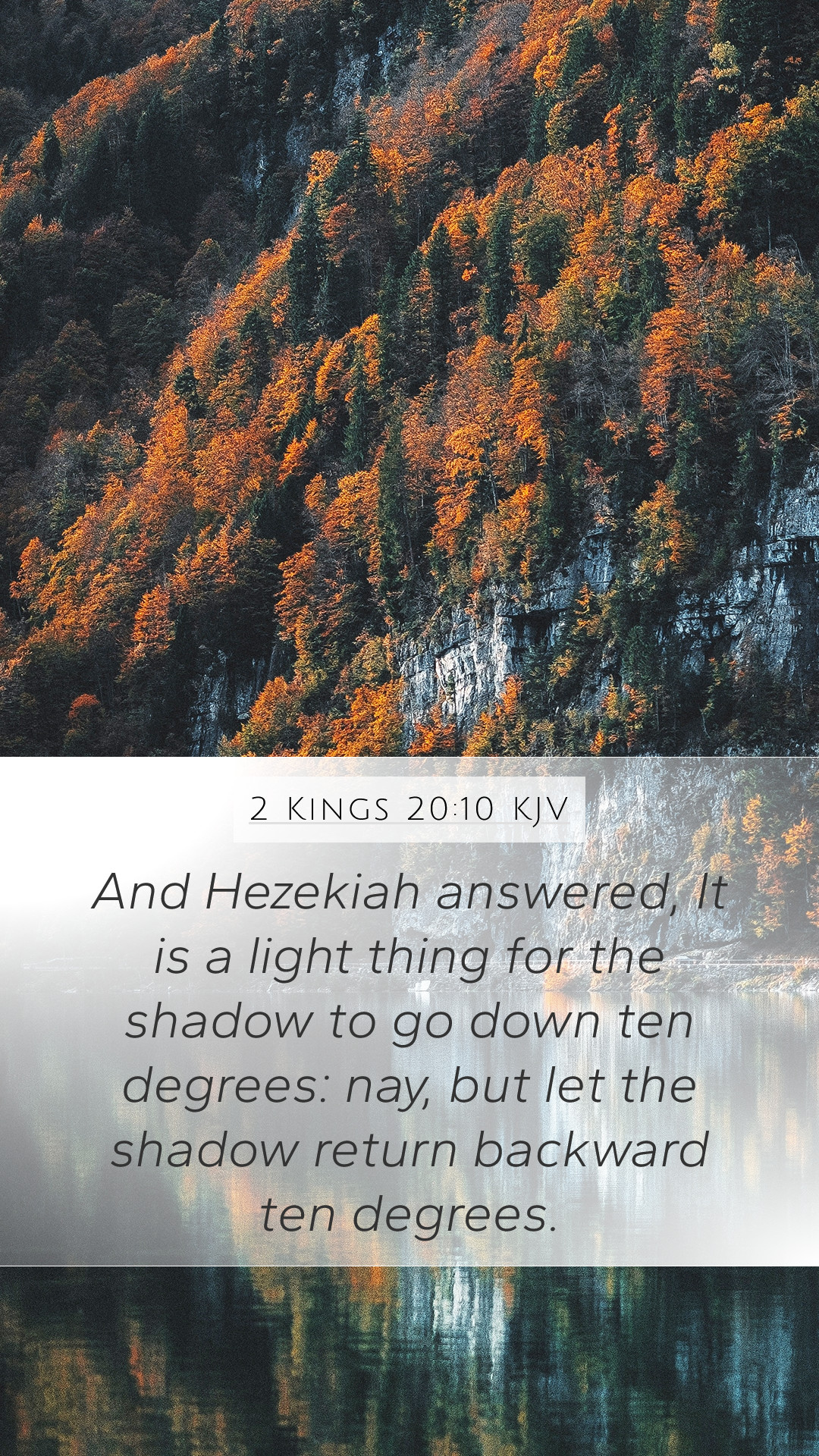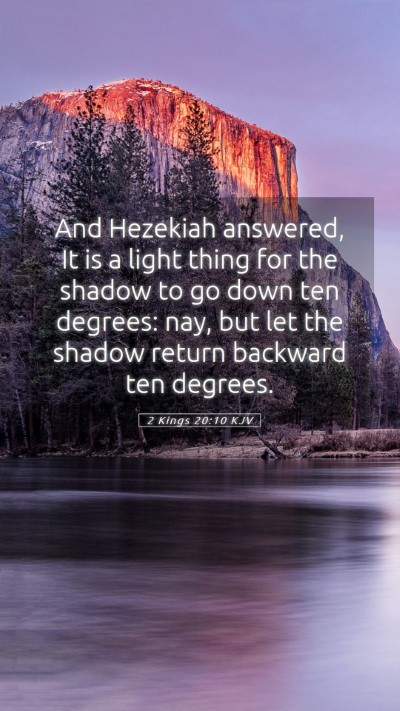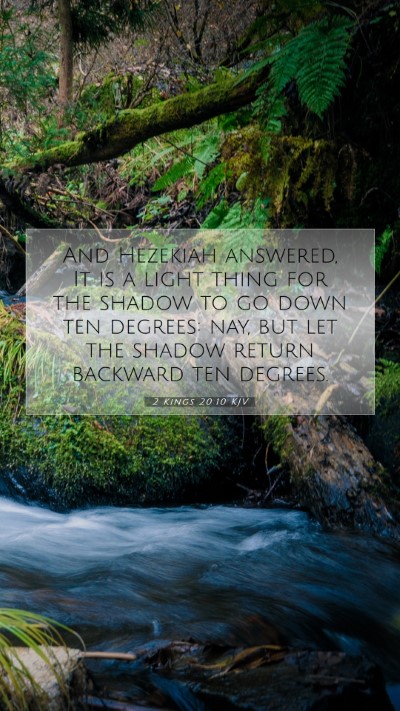Old Testament
Genesis Exodus Leviticus Numbers Deuteronomy Joshua Judges Ruth 1 Samuel 2 Samuel 1 Kings 2 Kings 1 Chronicles 2 Chronicles Ezra Nehemiah Esther Job Psalms Proverbs Ecclesiastes Song of Solomon Isaiah Jeremiah Lamentations Ezekiel Daniel Hosea Joel Amos Obadiah Jonah Micah Nahum Habakkuk Zephaniah Haggai Zechariah Malachi2 Kings 20:10 Meaning
What is the meaning of 2 Kings 20:10?
And Hezekiah answered, It is a light thing for the shadow to go down ten degrees: nay, but let the shadow return backward ten degrees.
2 Kings 20:10 Bible Verse Meaning
Bible Verse Meaning: 2 Kings 20:10
This passage presents a critical moment in the life of King Hezekiah, where he seeks assurance from the prophet Isaiah regarding the length of his life. The verse reads:
"And Hezekiah said, 'It is a light thing for the shadow to go down ten degrees; nay, but let the shadow return backwards ten degrees.'" (2 Kings 20:10, KJV)
Understanding Scripture: A Commentary on 2 Kings 20:10
In this verse, King Hezekiah expresses a desire for a more miraculous sign than a mere decline of the shadow on the sundial. His request for the shadow to go backward reveals his doubt and desire for affirmation from God regarding the prophecy that he would be healed and live longer. Below are insights drawn from various public domain commentaries.
Insights from Matthew Henry's Commentary
Matthew Henry points out that Hezekiah's request signifies a lack of faith, asking for a sign beyond what God had already promised him. Rather than accepting the assurance of healing and an extended life, Hezekiah wishes for a sign that would bolster his faith further. This reflects the human inclination to seek tangible proof of divine promises.
Albert Barnes' Interpretation
Albert Barnes elaborates that Hezekiah had received the word of the Lord through Isaiah which assured him of healing and that he would see a longer life. The fact that Hezekiah requests the shadow to go back ten degrees emphasizes his yearning for a miraculous sign, which could be interpreted as a symbolic act of God's power over time. It indicates that even great leaders can wrestle with doubts, particularly when faced with dire circumstances.
Adam Clarke's Exegesis
Adam Clarke comments on the nature of the miracle Hezekiah asks for, noting that it is a profound request demonstrating his desire for God's intervention in a dramatic way. Clarke also notes that the sundial being used is reflective of the Babylonian influence and that the request signifies Hezekiah's understanding of celestial bodies as part of God's creation, thus testing God's authority over nature.
Application in Bible Study
This passage, especially 2 Kings 20:10, is an important scripture that can be applied in various situations faced in daily life. It invites individuals to consider how they respond to the promises of God—whether with faith or with a demand for additional signs or assurances. The request for extra proof can mirror our own hesitations and doubts when faced with uncertainty.
Cross References
- Isaiah 38:1-5 - The prophecy regarding Hezekiah's healing and extended life.
- 2 Kings 20:8 - Hezekiah’s request for a sign from God.
- Isaiah 38:7-8 - The miraculous sign provided to Hezekiah.
- 2 Chronicles 32:24 - A parallel account of Hezekiah's illness and deliverance.
- Matthew 12:38-40 - Discussion about seeking signs and the nature of faith.
Conclusion
2 Kings 20:10 not only illustrates the historical narrative of Hezekiah but also serves as a larger metaphor for faith and doubt. This verse holds significant weight within the broader context of biblical teachings about God's promises and human responses. Through proper exegesis and biblical analysis, one can appreciate the complexity of Hezekiah's character, the nature of divine miracles, and the timeless relevance of these themes in our spiritual journeys.
FAQs: 2 Kings 20:10
What does 2 Kings 20:10 mean?
This verse captures Hezekiah's request for a miraculous sign that the promises of God were true, highlighting the tension between faith and the need for assurance.
How can I apply this verse in my life?
One significant application is evaluating your own faith in God’s promises, and considering whether you seek signs rather than trusting what He has already revealed.
Why did Hezekiah want a deeper sign?
Hezekiah's request stems from his human frailty and his struggle with doubt, showing that even the faithful can wrestle with their trust in God during challenging times.
Final Thoughts
Reflecting on the meaning of 2 Kings 20:10 contributes to a richer understanding of scripture as a whole. It emphasizes the need for faith in divine promises, while also acknowledging human doubts and desires. As you explore this and other scripture passages, consider engaging in group discussions or utilizing online Bible study resources to deepen your biblical knowledge and application in your life.


